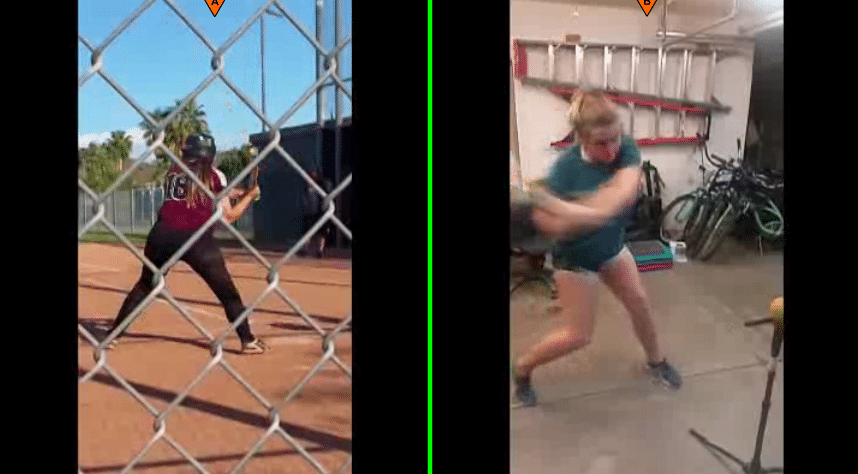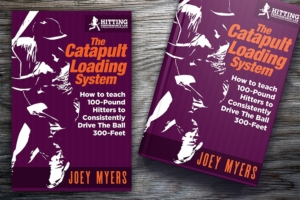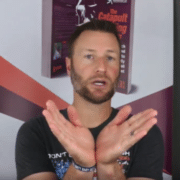How To Fast-Track Repeatable Power (A Struggling 16yo FP Hitter Case Study)
How a Dad Turned Around His Struggling 16-year-old Fast-Pitch Softball Daughter’s Swing in 1-Day?

1-day difference between swings, yes I know one is a game swing and one is off the tee, one is a back view and the other is a chest view, but the changes are still dramatic…
I was blown away by an email I recently received from the dad of Kelli, a struggling 16-year-old fast-pitch softball hitter…
And by the way, the following email was unsolicited, much like Marty White’s testimonial in this post about his son, 14-yo Hudson White, who participated in Brian Domenico’s 2016 National Power Showcase hitting 11 consecutive dingers out of the Texas Rangers ballpark in Arlington, averaging 398-feet, at only 5-foot 7-inches, 130-pounds.
I feel the following story of Kelli’s struggle holds true for quite a few baseball and softball hitters out there, and I wanted to share it. It breaks my heart to hear the BEFORE stories. But without the bitter baby, the sweet ain’t so sweet!
Please pay special attention to how Mike introduces new hitting content to his daughter. Sometimes this can be a slippery slope with parents and their daughters and/or sons.
DISCLAIMER: results aren’t typical. Hitters getting “it” or “not” depends on a few things: 1) Player engages in consistent deep practice, 2) Coach successfully connects player to message (the WHY), 3) Material presented in a way to set player up for success not overwhelm, and 4) Coach taps into player’s primary learning style to name a few of the biggies.
Enter Mike’s email…
“Joey: I saw your book “Catapult Loading System” on Kindle and figured I’d take a chance on it because I have always liked to read different philosophies on hitting. I’ve been coaching my daughter and her teams in fast-pitch softball for over 8 years starting with Rec through Club ball here in AZ.
Lately, to my disappointment my daughter has taken a break from club ball for the last 6 months but has just started playing again on her High School JV team. She is a power hitter but has been struggling with weak grounders and pop ups.
After I read your book I asked her to work with me for 10 minutes a night hitting into the net off a T.
(She’s 16 and this was all could get out of her, so I took what I could get.)
I noticed when I took some videos of her during games that she was stepping into the bucket on her stride and was leading her hands with the back elbow, which I know is a no, no and creates bat drag.
Those two things combined were causing her to dip the bat off plane and not hit the ball solid, causing the pop ups and grounders. She was basically trying to “lead with the hips and start her swing from the ground up” like I had been teaching her for years.
After reading your book, I didn’t want to overwhelm her or totally change her swing so I just focused on the bottom three fingers of the top hand tightening in the swing and showing the numbers by loading the shoulders as you explain in the book.
I also told her to shorten her stance a bit so she would focus on loading the shoulders (showing the numbers and hide the hands) rather than taking a big stride and stepping into the bucket.
I wish I could send you the videos of the before and after of her swing after one 10 minute session. I’m not kidding when I say that it was almost an “instant” change for the better.
What I noticed by having her tighten her bottom three fingers on the top hand, is it forced her to keep her back elbow in the slot and her hands to stay in front of the back elbow. This immediately corrected her bat head to stay on plane in the zone longer with no casting or weak bat angle.
I also noticed that by having her load with the shoulders rather than relying on her hips with a big stride, she didn’t step into the bucket or fly open with her hips.
These simple little tweaks helped to correct the things I’ve been working with her for years but to no effect. I couldn’t believe the difference from such a small simple adjustment.
I’ve told some of my softball friends and fellow coaches about it and they just look at me and chuckle like I’m making up some kind of tall tale. I’ve even shown them the before and after video and they still seem skeptical.
But here’s the bottom line…
The day after I worked with my daughter for all of 10 to 15 minutes, literally hitting about 35 or 40 balls off the T, against one of the best teams in our division, she got up with two runners on, with two strikes and launched a bomb for a three run HR. She went 2 for 2 that day.
That night we spent another 10 minutes working the same drills and the next day, she did the same thing on her first at bat hitting another bomb. She went 3 for 3 that game.
Now look, I’m not a scientist nor am I into hockus pockus but I have to admit I’m a true believer and just had to tell you about our instant success by using some of the small tweaks you talk about. I plan to keep using these ideas and I’m going to re-read your book again to make sure I didn’t miss anything.
Thanks for the info and know you have another success story here in Arizona.” – Mike Monaghan
After I asked for Mike and Kelli’s permission to publish her story and for the BEFORE and AFTER videos to do analysis on, I received this follow up from dad…
“I apologize that these two videos are from a back vs front view but the differences can still be seen. The before video is a game swing with her uniform on and are only a day apart. If you can run them in slow motion, you’ll notice a couple things that made the world of difference.In the before:
- Wider stance (in my opinion, too wide)
- More lateral movement because she doesn’t load at the shoulders (show her numbers)
- Steps in the bucket as her hips fly open
- Back elbow is leading the hands
- Bat angle is well below the ball plane as she starts her swing
- Result….pop up to pitcher
After video:
- All we worked on was tight bottom three fingers on top hand, loading at the shoulders (showing the numbers) and a slightly narrower stance. Results:
- Back elbow is behind the hands and she has a much more solid impact on the ball
- Bat head stays on plane with ball longer allowing a line drive impact on ball (not too much bottom half or top half on the ball)
- She doesn’t fly open with her hips and her body stays in alignment longer (notice where her foot lands on the second video…..right on the line in the cement on the floor.) I think the shoulder load (and I know she could probably show even more of the numbers if we keep working on it) prevents her or at least minimizes her from flying open. You probably have a video link to some sport’s scientist that can explain how the shoulders and spine work together and keep the hips in check….Lol!
Bottom line results….2 HR’s in two games….much more solid impact on other hits.Stepping in the bucket has been a huge issue we have tried to correct for years with little to no success and although I know we need to keep working a couple minutes a night to turn these tweaks into habit, I still can’t believe how quickly she made a change. It might also explain why I get so many skeptical looks and opinions when I talk about your book to other coaches and show them the results after a one day difference. If I hadn’t witnessed this with my own eyes, I’d probably be skeptical too.Her instant success has also done a few things I never thought possible. She actually likes working with me in the garage hitting into the net at night because it is no more than a 10 minute session and she can still enjoy being a teenager. She actually will listen to my instruction and corrections and wants me to video her so she can see that she’s doing it correctly. When she was little, we use to go to the park and hit 100 balls off a machine or soft toss but those days of daddy/daughter time are limited so a 10 minute session is something she is OK with. Its a win/win for both of us.”
Thank YOU Mike I appreciate your support. Great approach in getting that young lady of yours “hooked” again. It sounded like a tall order, but you pulled it off nicely Coach. I’m proud of both of you!
Also Mike, here are my next step swing suggestions:
- CLICK HERE for a video on how to fix stepping in the bucket using resistance bands,
- Finish up with the rest of the concepts in the Catapult Loading System book, then…
- CLICK HERE for the Float Variance Drill, and
- CLICK HERE for a definitive guide to forward momentum.
For those of you who may have missed Coach Mike’s effective approach with his teenage daughter, here are a couple key points:
- Mike set his daughter up for success by telling her to only commit 10-mins per day to this new information (I tell my hitters to spend 5-mins/day, at least 4-days/week in deep practice),
- He had the humility to admit (to his daughter I assume) that his teachings may have been misplaced in the past (this is part of a Growth Mindset by the way),
- Didn’t want to overwhelm her, so Mike started with one thing first, “Finger Pressure”, then when she got that, he moved onto “Showing Numbers”, and lastly
- Mike has a “results don’t lie” story to tell the naysayers, whether they heed his advice only time will tell…but the truth is undeniable.
This works for softball players folks…not just baseball. If you aren’t growing as a coach, then you’re dying. Dead things get thrown in the trash. Cultivate a Growth Mindset coaches or else you’ll be short changing your players, and your significance as an effective coach.
The times are a changin’…
UPDATE on Kelli…
Joey: You had asked me to keep you up to date on how Kelli had progressed after I worked the Catapult Loading System with her. I’m proud to give you her final stats after 17 games. You can note that we worked the system after game 7, so her results were really proven in the last 10 games. Up until we worked the system, she had only one HR and most of her hits were weak ground balls in the gaps and bloopers over the infield. Although she had decent numbers before working the system as I had told you in previous emails, her hitting really came alive and her hits were much more powerful. She had very few if any extra base hits in the first 7 games and the triples and doubles really took off in the last 10 games. Although she was playing JV, we are in the 6A division playing some of the largest and most competitive schools in the state of AZ and she lead the team in almost every category or was in the top three out of 19 girls on the team.
- Games played: 17
- Batting Average: .652
- Plate Appearances: 48
- At Bats: 46
- Runs scored: 22
- Hits: 30
- RBI: 26
- Doubles: 9
- Triples: 2
- HR: 4
- BB: 2
- K: 1
- OBP: .667
- SLG: 1.195
- OPS: 1.863
- Best Youth Baseball Hitting Program to Boost Rotational Power Fast—Trusted by MLB’s Rajai Davis & Built on the Catapult Loading System - June 22, 2025
- The #1 Arm Care Program for Youth Baseball: Why Top Travel Coaches Trust Jaeger’s J-Bands & Long Toss Routine to Prevent Injury Fast - June 3, 2025
- Are Baseball Hitting Lessons Worth It in 2025? Fix Your Kid’s Swing Fast With Pro-Approved Drills (Before You Waste Another $60) - May 29, 2025













This is a great article…..I love those two cues….I have question Joey…. I know I should know the answer but for some reason I’m failing to remember…. when you teach showing the numbers, do you use a focal point Somewhere on how to twist/turn/show the numbers?
For example, the actually numbers, the top of the rib cage, the lead arm, the lead pinkie …etc… Obviously having the same approach is important and sometimes having different approaches just means we do the same thing( ending) but start from different points….
Anyway, these are some great points…If you ever had a top 5 cues… these would have to
be in the top 5….
~DM
Thanks Djura. No, I don’t get too specific on the focal point with my hitters, but you can. I just have a “Back Eye Test” to make sure they’re not turning inward too much: https://hittingperformancelab.com/softball-batting-drills-for-power/